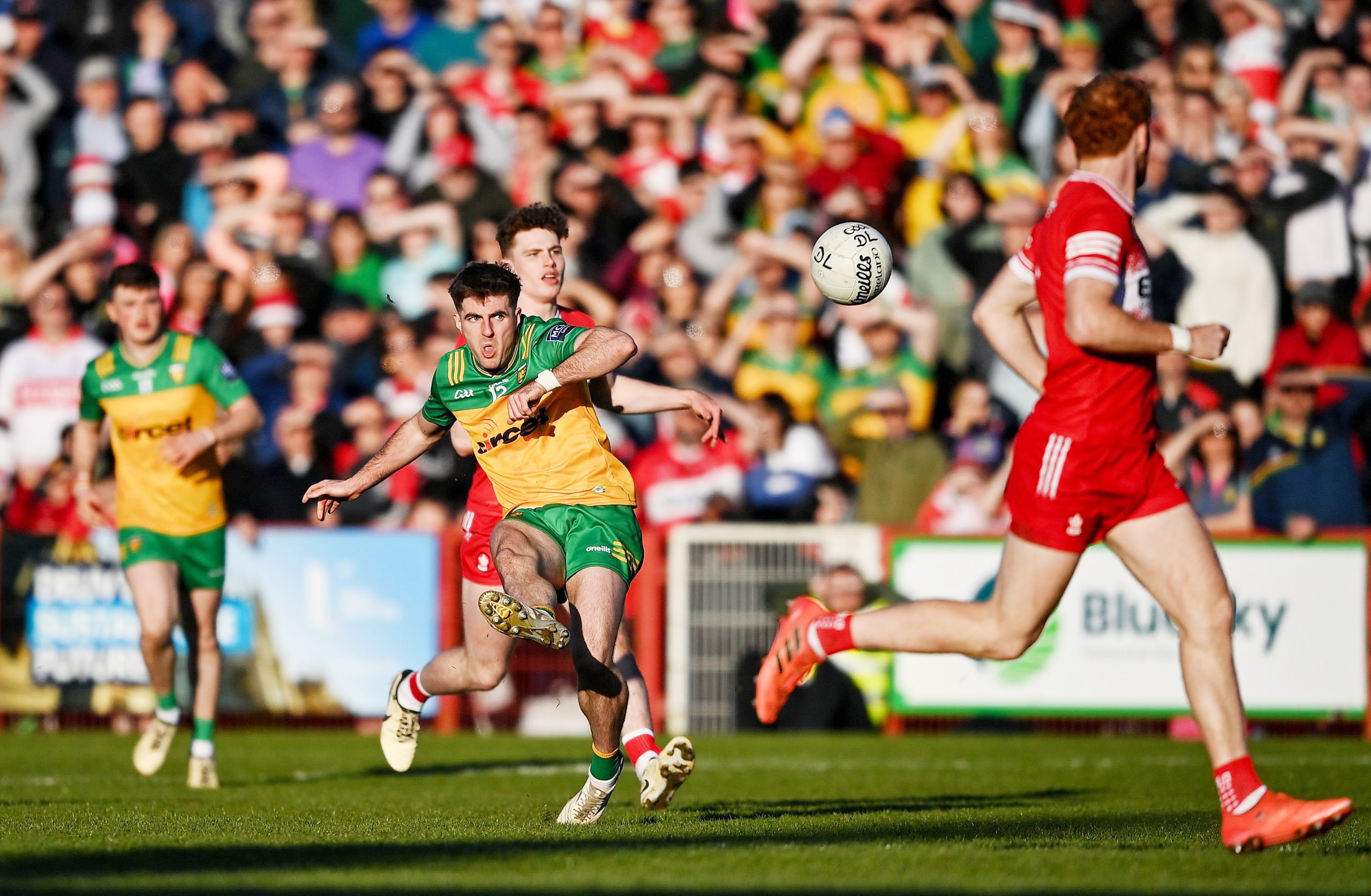WHEN Jim McGuinness was with Donegal in his first tenure they placed a lot of stock on the third quarter of games.
They would have come out of the blocks all guns blazing at the start of the second half and gave everything they had. Suddenly they had scored maybe 1-4 or 1-5 on the bounce and effectively wrestled control of a game.
As a player I have been on the receiving end of this myself. In 2014, Derry went into half-time in a strong position and within 10 minutes Donegal had scored 1-5 and any advantage we had had been completely wiped out.
On Sunday past in Ballybofey it was sort of similar. Going in seven points down at the break, Derry had to come flying out of the blocks and they did, hitting three scores (five points in total) in a row and reducing this deficit to two points.
This was no mean feat but then within a further 10 minutes the margin was back out to seven again and all of Derry’s good work seemed to be undone in the blink of an eye. From this point forward, there was an air of inevitability about the outcome as Donegal seemed to keep Derry at arm’s length, stretching the game each time they came up the pitch as Derry had to gamble a bit more and leave gaps at the back.
This allowed Donegal to reel off scores fairly easily and run out fairly comfortable winners in the end. A 10-point margin on the scoreboard would show this but the intriguing thing is that it was only small things that tipped the scales.
Obviously I might be looking at this with my red-tinted glasses to try to put a positive spin on things, but when you look at a penalty miss and then add in three points which Derry conceded from the ball being moved forward by the ref, you’re talking about a six-point swing.
Now I know those decisions are part of the game now with the new rules and you have to plan for them, but none of them were a deliberate attempt to obstruct play in a manner which they were brought in for.
Indeed two of them against Brendan Rogers were very unlucky. For the first, the Donegal man seemed to take his four steps and then Rogers stepped in for a tackle. For the second I didn’t even realise it was an offence – Ryan McHugh showed petulance towards Conor Doherty and Rogers pulled him away, it wasn’t as if he was stopping a free or obstructing the play. Indeed if Brendan Cawley wanted to impose the rules in a literal fashion he could have easily brandished a red card to talisman Michael Murphy.
Everything looks worse in slow motion but even in real time it was obvious to most that this was as far removed from a legitimate tackle as you can get.
Notwithstanding all of the above, Donegal were deserved winners, played the better football and were ultra-clinical in everything they did, especially in an attacking sense. They had 33 shots from 34 attacks, an amazing statistic, of which they got 24 scores. That is the sort of efficiency which when you get to Croke Park later in the year will be hard to beat.
As for Derry, where do they go from here? They have five weeks to regroup for the group stages of the All-Ireland. This might give a bit more time to get bodies back on the pitch. It’s no secret that they have been missing a number of key players now although this was not suddenly sprung upon them.
Getting their key men fit and playing well is central to Derry moving forward, more so than any other team who have notions of challenging. Why might you ask?
Well, Donegal were able to bring on the towering Jason McGee, All-Star Oisín Gallen, and experienced players Niall O’Donnell and Jamie Brennan. This is with Eoghan Bán Gallagher and Michael Langan still waiting in the wings.
Derry brought on Patrick McGurk and Cahir McMonagle for their championship debuts, added to the fact they gave three other players their championship debut on the day. This shows you the stark difference in panel depth and follows on from comments made last week by Gareth McKinless about how Derry purposely worked with a small panel over the last number of years.
That tactic under Rory Gallagher has maybe come back to bite them a little. Panel depth is massive in this new game and it’s difficult to develop players who are of county standard overnight – this is usually a two- to three-year process unless in exceptional circumstances.
Unfortunately for Derry, replacing those players who have recently retired (Chrissy McKaigue, Benny Heron and Emmett Bradley), simply isn’t a case of ‘next man up’.
It’s back to the drawing board and looking forward for development and that might seem strange for a team that was so close a few years ago but that’s the reality of it.
Look at the current Dublin team. People are saying they are bringing in all these new unknown players, that it’s a period of transition and will take time to adjust. Looking at it more closely, all these players are 23/24 and have been in the squad for three or four years and are at the levels they need to be.
They’re not simply joining the squad six months or a year ago and being thrust in.
As for Donegal, they made the last-four last year, narrowly losing out to Galway. They seem to have developed their squad further than last year and the return of Murphy is a massive boost to them too.
In terms of progression, they will be looking at kicking on and going one step further and they are well equipped to do so. Don’t be surprised to hear ‘The Hills of Donegal’ blaring out over the speakers of Clones or Croke Park before the year is out.
Receive quality journalism wherever you are, on any device. Keep up to date from the comfort of your own home with a digital subscription.
Any time | Any place | Anywhere














